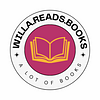Take a photo of a barcode or cover
slow-paced
lighthearted
fast-paced
Plot or Character Driven:
Plot
Strong character development:
Yes
Loveable characters:
No
Diverse cast of characters:
Yes
Flaws of characters a main focus:
Yes
I didn’t realize it was going to be a literal modern day Twelfth Night and it felt very much like she’s the man.
adventurous
emotional
lighthearted
medium-paced
Plot or Character Driven:
Plot
Diverse cast of characters:
Yes
Flaws of characters a main focus:
Yes
funny
lighthearted
medium-paced
Disclaimer: I'm not super into Olivie Blake's books. I read Alone With You in the Ether in June 2022, which feels like a million years ago, and gave it four stars, but I would almost certainly enjoy it much less now. I read The Atlas Six in September 2024, and got a great rant review out of it (I won't be reading the rest of the series anytime soon). On the flip side, I read her short story collection Januaries in January 2025 and enjoyed it (with a few caveats)! To summarise: I have mixed feelings about her books. They often feel over-written, and I hate her handling of social issues. For some reason, in June 2025, I still feel like I want to find a book by her that is for me.
Twelfth Knight could've been that book. One of my favourite romance books is Sunny Disposition, which shares some characteristics with Twelfth Knight: the female main character is a gamer; the male main character is an athlete who was injured; the main trope is hidden identity; it is dual POV. However, this is proof that a romance book cannot just be a collection of tropes. I'm tired of grumpy men in romance, but Sunny Disposition does it well! I'm tired of miscommunication in romance, but Sunny Disposition does it well! Okay, maybe that just means I don't like hidden identity and I got lucky one time? Well, I also really liked The Neighbor Favour, another dual-POV romance book featuring hidden identity. It can be done really well! Olivie Blake, on the other hand, slapped a bunch of things she wanted in a book onto a wall and expected them to stick.
I think my brain's already repressed a bunch of things I didn't like about the book, so I'm hoping writing this review will help jog my memory. The downside of that is that it might make me hate the book, so I'll start with the positives: I enjoyed the first half of the book! It wasn't stellar, maybe a 3.5*, but I was enjoying it! It was a good time! We were getting to know the characters! I think it was the best writing I've read in an Olivie Blake book, maybe because for a YA book she stripped down her otherwise superfluous prose. Whatever the reason, it was such a relief. I also enjoyed both POVs as both characters had their own problems and goals. My favourite side character was probably Bash, who is a sweetheart and who contrasts Viola in the best way.
I suddenly feel exhausted at the prospect of writing this review because it is all downhill from here. Future me deserves to remember all the things I was angry about, but at what cost? Present me's sanity? Fuck it, I'll write the rest of the review later today or tomorrow.
Okay, I lied! It is over a week later, and I think I've already forgotten most of my issues with the book. I do still feel a surge of irritation whenever I think about it though. I will try my best!
I think my main issue with the book ultimately comes down to the fact that it feels too centred on Viola. Now, I normally wouldn't think of that as much of an issue in contemporary romance books: I've read too many books where the female main character seems to exist solely to "fix" the emotionally-detached male main character and make him a viable love interest, so a woman-centred romance isn't a bad thing. However, Olivie Blake doesn't do this well.
One of Viola's central problems in the book is that people don't like her because she doesn't allow entitled guys to step all over her. Misogyny is supposed to be one of the main themes, but as I said before, Olivie Blake doesn't write social issues very well. By the end of the book, she has learnt that some guys are good: her twin brother, her boyfriend, her mum's boyfriend, and the multiple male friends she's made. One of the lessons she is taught is that she should be more conciliatory and less combative, which isn't inherently a bad thing, but it put a bad taste in my mouth because there are very few female characters that this applies to. Yes, Viola learns how to be more likeable, but it seems as though this lesson only applies to the guys in her life.
(TW for a mention of sexual assault in the spoiler.) Viola has two female friends in the book. One is Olivia, who is genuinely written well and who I don't want to spoil anything about. The other, whose name I've already forgotten, is written... less well. They aren't on speaking terms with each other for most of the book because she doesn't like how Viola rejects an awful guy who asked her out on a date (and her general behaviour towards misogynistic guys). They only reconcile becausethe friend is pressured into sex by the guy who was rejected by Viola , and this makes her realise that Viola was right all along. Immediately after she tells Viola this, Viola starts talking about her own problem with her boyfriend. Are you kidding me? My jaw dropped at this moment because I could not believe that Olivie Blake would write something as awful as that and then brush it away in the next paragraph. (End of TW.)
What made this worse for me was that Viola's problem was manufactured by herself. The plot is essentially about miscommunication: Viola is hiding her secret online identity from the classmate she's been gaming with, while they're falling for each other in real life. They don't even have romantic chemistry with each other! But that's neither here nor there. Viola has the audacity to create this problem for herself, while her twin brother Bash is making himself sick (I'm not joking, he genuinely gets sick over this) over the whole situation and she won't listen to his advice and confess to our male love interest.She's dating him at this point! How are you still keeping this a secret from the guy you're dating? AND EVEN WORSE THAN THAT. IT GETS RESOLVED OFF PAGE. It's unbelievable! The two love interests have a whole argument about it, but we don't get to see it. It's just magically fixed, I guess? What was the point of all the build-up if we don't see the resolution? Every bit of angst in this book, romantic or otherwise, is handled so badly.
Since I mentioned Bash getting sick over the whole thing, I wanna say that that is a consistent thing that happens. Viola doesn't treat the side characters all that great, especially Bash. He should be more mad at her! She also doesn't treat her mum very well. All of their issues seem to revolve around Viola. Otherwise, it seems like they'd be living perfect lives or something. Viola just cannot communicate!
By comparison, Jack doesn't really have many flaws. His life is falling apart around him, and he deals with it as expected. He's worried about his girlfriend who hasn't been speaking to him. He's trying to build a decent working relationship with Viola and doesn't understand why she's prickly. His parents have wildly different but equally stressful expectations of him. It feels like his friends are leaving him behind. I don't know, he just deals with all of this realistically, while Viola is actively setting fire to her life.
That's sort of a lacklustre ending to a rant review but I think I've gotten a weight off my shoulders. I don't know. I don't want to think about this book ever again.
Twelfth Knight could've been that book. One of my favourite romance books is Sunny Disposition, which shares some characteristics with Twelfth Knight: the female main character is a gamer; the male main character is an athlete who was injured; the main trope is hidden identity; it is dual POV. However, this is proof that a romance book cannot just be a collection of tropes. I'm tired of grumpy men in romance, but Sunny Disposition does it well! I'm tired of miscommunication in romance, but Sunny Disposition does it well! Okay, maybe that just means I don't like hidden identity and I got lucky one time? Well, I also really liked The Neighbor Favour, another dual-POV romance book featuring hidden identity. It can be done really well! Olivie Blake, on the other hand, slapped a bunch of things she wanted in a book onto a wall and expected them to stick.
I think my brain's already repressed a bunch of things I didn't like about the book, so I'm hoping writing this review will help jog my memory. The downside of that is that it might make me hate the book, so I'll start with the positives: I enjoyed the first half of the book! It wasn't stellar, maybe a 3.5*, but I was enjoying it! It was a good time! We were getting to know the characters! I think it was the best writing I've read in an Olivie Blake book, maybe because for a YA book she stripped down her otherwise superfluous prose. Whatever the reason, it was such a relief. I also enjoyed both POVs as both characters had their own problems and goals. My favourite side character was probably Bash, who is a sweetheart and who contrasts Viola in the best way.
I suddenly feel exhausted at the prospect of writing this review because it is all downhill from here. Future me deserves to remember all the things I was angry about, but at what cost? Present me's sanity? Fuck it, I'll write the rest of the review later today or tomorrow.
Okay, I lied! It is over a week later, and I think I've already forgotten most of my issues with the book. I do still feel a surge of irritation whenever I think about it though. I will try my best!
I think my main issue with the book ultimately comes down to the fact that it feels too centred on Viola. Now, I normally wouldn't think of that as much of an issue in contemporary romance books: I've read too many books where the female main character seems to exist solely to "fix" the emotionally-detached male main character and make him a viable love interest, so a woman-centred romance isn't a bad thing. However, Olivie Blake doesn't do this well.
One of Viola's central problems in the book is that people don't like her because she doesn't allow entitled guys to step all over her. Misogyny is supposed to be one of the main themes, but as I said before, Olivie Blake doesn't write social issues very well. By the end of the book, she has learnt that some guys are good: her twin brother, her boyfriend, her mum's boyfriend, and the multiple male friends she's made. One of the lessons she is taught is that she should be more conciliatory and less combative, which isn't inherently a bad thing, but it put a bad taste in my mouth because there are very few female characters that this applies to. Yes, Viola learns how to be more likeable, but it seems as though this lesson only applies to the guys in her life.
(TW for a mention of sexual assault in the spoiler.) Viola has two female friends in the book. One is Olivia, who is genuinely written well and who I don't want to spoil anything about. The other, whose name I've already forgotten, is written... less well. They aren't on speaking terms with each other for most of the book because she doesn't like how Viola rejects an awful guy who asked her out on a date (and her general behaviour towards misogynistic guys). They only reconcile because
What made this worse for me was that Viola's problem was manufactured by herself. The plot is essentially about miscommunication: Viola is hiding her secret online identity from the classmate she's been gaming with, while they're falling for each other in real life. They don't even have romantic chemistry with each other! But that's neither here nor there. Viola has the audacity to create this problem for herself, while her twin brother Bash is making himself sick (I'm not joking, he genuinely gets sick over this) over the whole situation and she won't listen to his advice and confess to our male love interest.
Since I mentioned Bash getting sick over the whole thing, I wanna say that that is a consistent thing that happens. Viola doesn't treat the side characters all that great, especially Bash. He should be more mad at her! She also doesn't treat her mum very well. All of their issues seem to revolve around Viola. Otherwise, it seems like they'd be living perfect lives or something. Viola just cannot communicate!
By comparison, Jack doesn't really have many flaws. His life is falling apart around him, and he deals with it as expected. He's worried about his girlfriend who hasn't been speaking to him. He's trying to build a decent working relationship with Viola and doesn't understand why she's prickly. His parents have wildly different but equally stressful expectations of him. It feels like his friends are leaving him behind. I don't know, he just deals with all of this realistically, while Viola is actively setting fire to her life.
That's sort of a lacklustre ending to a rant review but I think I've gotten a weight off my shoulders. I don't know. I don't want to think about this book ever again.
emotional
lighthearted
medium-paced
emotional
funny
medium-paced
Plot or Character Driven:
Character
Strong character development:
Yes
Loveable characters:
Complicated
Diverse cast of characters:
Yes
Flaws of characters a main focus:
Yes
hopeful
lighthearted
medium-paced
Plot or Character Driven:
Character
Strong character development:
Yes
Loveable characters:
Yes
Diverse cast of characters:
Yes
Flaws of characters a main focus:
Yes
emotional
funny
lighthearted
medium-paced
Plot or Character Driven:
A mix
Strong character development:
Yes
Loveable characters:
Yes
Diverse cast of characters:
Yes
Flaws of characters a main focus:
Yes
adventurous
emotional
funny
hopeful
inspiring
lighthearted
reflective
medium-paced
Plot or Character Driven:
Character
Strong character development:
Yes
Loveable characters:
Yes
Diverse cast of characters:
Yes
Flaws of characters a main focus:
Yes
adventurous
emotional
funny
hopeful
medium-paced
Plot or Character Driven:
A mix
Strong character development:
Yes
Loveable characters:
Yes
Diverse cast of characters:
Yes
Flaws of characters a main focus:
Yes
love love love. super good details and great characters. more about dealing w anger (as she mentions in the acknowledgments) than a romance but not overtly so. the relationship development also feels so natural i loved it





